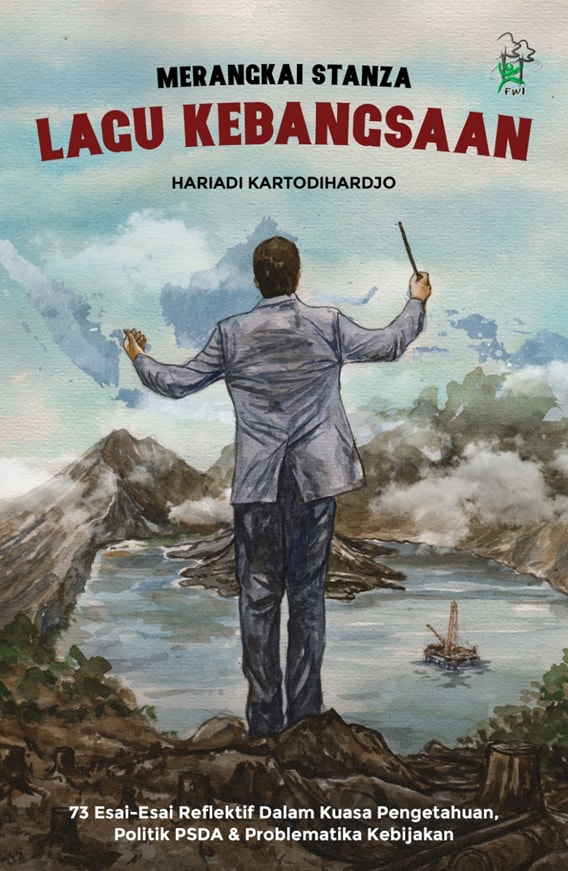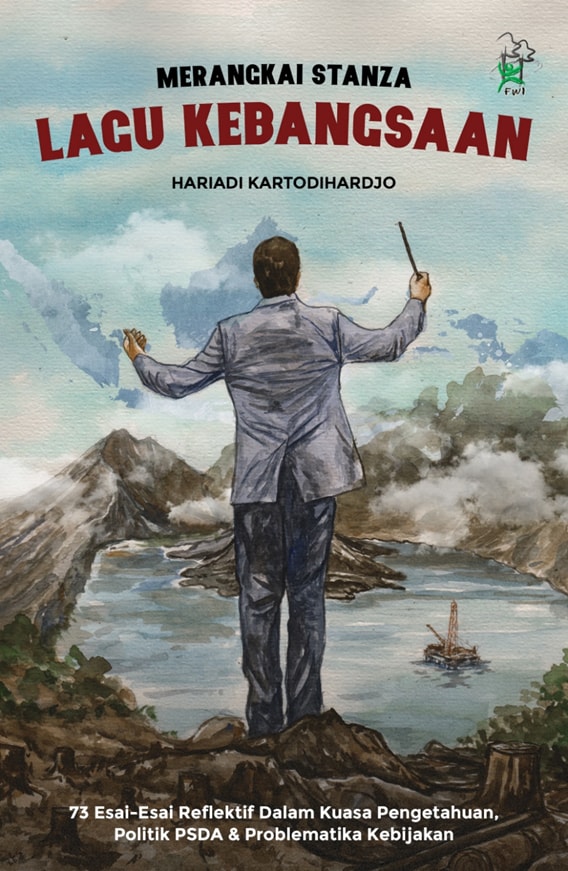“COMPOSING THE STANZA OF NATIONAL ANTHEM” – PROF. HARIADI KARTODIHARDJO 2018
S’lamatlah ra’jatnja,
S’lamatlah poetranja,
Pulaunja. Lautnja, semuanja,
Madjulah Negerinja,
Madjulah pandunja,
Oentoek Indonesia Raja.
(Indonesia Raya Song, Stanza III)
Starting from the compassion, seeing the scattered meaningful thoughts. Then, encounter the intentions and goals; Writer and Editor Team. Important book compilations and extensive publications. However, textual texts remain important in the middle of this great digital and online wave. Then, the intention grew stronger. “This is not just the collection of ideas, but also a historical task”. Because, in the end, what is left is the text. This is agreed together.
Plans and work stages were arranged immediately. The moment is in the 73rd of the Independence of the Republic of Indonesia. Thus, the study for the substance of data was collected. Evidently, the raw material for the substance of the writing surpasses the total need. Although limited, it still stands at 73, the same as the spirit of independence. Therefore, various editorials were conducted. Arrange categories and classification of writings, organize the topics of each chapter, looking for a common thread in the range of ideas in the text (become the main contributor for the book title), until the technical process of making illustrations, layout, and final editing.
Honestly, there is not much hard work, and the Editor Team manage a variety of texts that all have included in the type of “finished goods” of this reflective essays by Prof. Hariadi Kartodihardjo. It just takes a little clarity to catch the main, typologization techniques and topic classification, fix the editorial editing and decorate it in the art of layout and illustration. The rest of his writings are actually able to speak independently. Even though without a compilation of this book.
Why is this book compilation still important? At least based on three things: First, the reflective essays are scattered in many separate spaces. Starting from the notes on Facebook (FB), magazine, news, until WhatsApp groups. At least this compilation book will help the readers to enjoy essays scattered in many places in one hand. Second, there is a strong common thread from the scattered essays, which are consistently repeated, developed and emphasized in a choice of reflective tones.
Reading them separately may be possible to call out various forms of reflection and each other’s personal notes. However, reading it repeatedly in one compilation text, it is expected that the call for reflection can be more resonant, steadier and sharper. The end of that hope is to obtain the change of behavior-thinking, no matter how simple it is. Because deviate thinking is the beginning/root of deviate action. Not only at the personal, local, or regional level, but also related to other national issues, especially in the various forms of socio-ecological crises that are getting more chronic and repeatedly. This common thread has inspired the main title of this book.
Third, there are two books that precede the range of ideas by Prof. Hariadi Kartodihardjo on a similar issue, which is actually closely related to this compilation book. A book of introduction entitled “Analisa Kebijakan; Pengelolaan Sumberdaya Alam, Diskursus – Politik – Aktor dan Jaringan”, (Sajogyo Institute, AURIGA, RMI, dll, 2016) then continued with “Dibalik Krisis Ekosistem; Pemikiran Tentang Kehutanan dan Lingkungan Hidup” (LP3ES, 2017). The first book explained the basic theory and main concepts in the scientific policy analysis related to the Natural Resources issues.
It is presented for the academic and other intellectual segments. The second book strongly delivered the messages about policy practices related to Natural Resource and its main problems. Ranging from the paradigmatic lawsuit, gaps in the policies and its empirical practices, wrongly determined the problem, the power of beyond state operations, practice of state chapter, neglect of social dimension, until the challenges of trans-disciplinary development, etc. This book seems to refer to the group segments of policymakers, practitioners, and activists, especially those who moved in the circle of natural resources crisis issues.
Thus this compilation book of reflective essays will complete and continue the main ideas of two previous books. It is wrapped with a language that is more comfortable, compact, and reflective. Although it must be admitted, in some writings can not be separated from Prof. Hariadi Kartodihardjo’s style and choice of language with an “academic” tone, according to the taste of diction that had been chosen in his writings. Not only that, by presenting the ideas in the form of essays and reflections, this book aims to address a wider variety of circles and communities without being limited by certain social categories.
On the other hand, the spirit of reflections is presented, because “time of the moment” hides the daily thoughts and actions — in the all-effective, efficient, mechanistic, and atomistic ranges and the impact of the decrease in other economistic market cultures — it seems to be something luxury and increasingly expensive. That is the expectation of the Editor Team from this book.
Finally, this book is the result of teamwork, especially for friends at Forest Watch Indonesia (FWI) who since in the beginning, were sensitive and insisted so that this book will come soon. Besides the “assist” all that remains is the goal from Prof. Hariadi itself. Therefore, we, as the Editor Team, would like to express our deepest gratitude, especially for Prof. Hariadi Kartodihardjo, who is pleased and allow his writings to have complied in this book. We would also like to thank our friends at FWI, especially for Bang Bob Purba, Mas Sulton, Teh Linda, Amel, Pardi, and others that cannot be mentioned one by one.
The Editor Team and FWI believe the importance of spreading smart ideas as an entry point for public awareness and as a medium for connecting ideas between generations. Hopefully, all of these efforts can be good examples for the next generations. Because each generation has its own historical task. Let’s get started in our respective struggles…!!!
Enjoy this book.
Bogor August 2018
EDITOR TEAM





